VPN protocols like OpenVPN and WireGuard determine how your data encrypts and travels across the internet. OpenVPN offers strong security with flexible options but can be slower and more complex to set up. WireGuard provides faster, simpler connections using modern cryptography but may have limited device support. Choosing the right one depends on your priorities for speed, security, and ease of use. Keep exploring to understand which protocol fits your needs best.
Key Takeaways
- OpenVPN and WireGuard are VPN protocols that secure data through encryption, with OpenVPN using AES-256 and WireGuard employing ChaCha20.
- OpenVPN offers extensive device compatibility but can be more complex to set up, while WireGuard provides a simpler, faster setup process.
- WireGuard is lightweight and optimized for speed and power efficiency, whereas OpenVPN may consume more processing resources.
- Both protocols support cross-platform use, but WireGuard’s modern design makes it ideal for mobile devices and performance-focused users.
- Future developments aim for protocols that balance high security, speed, ease of deployment, and resistance to quantum computing threats.
What Are VPN Protocols and Why Do They Matter?

Have you ever wondered how a VPN keeps your online activity secure? VPN protocols are crucial because they determine how your data is encrypted and transmitted. They rely on robust encryption standards to protect your information from hackers and eavesdroppers. User authentication is another critical aspect, ensuring only authorized users can access the VPN network. This process verifies your identity before granting access, adding an extra layer of security. Without effective protocols, your data could be vulnerable to interception or tampering. Different protocols prioritize speed, security, or ease of use, which is why understanding their role is fundamental. Additionally, some protocols, like Glycolic Acid, are designed to optimize specific features such as speed or security in their respective fields. In essence, VPN protocols act as the foundation that keeps your browsing safe, private, and protected from digital threats.
Overview of OpenVPN: Features and Functionality
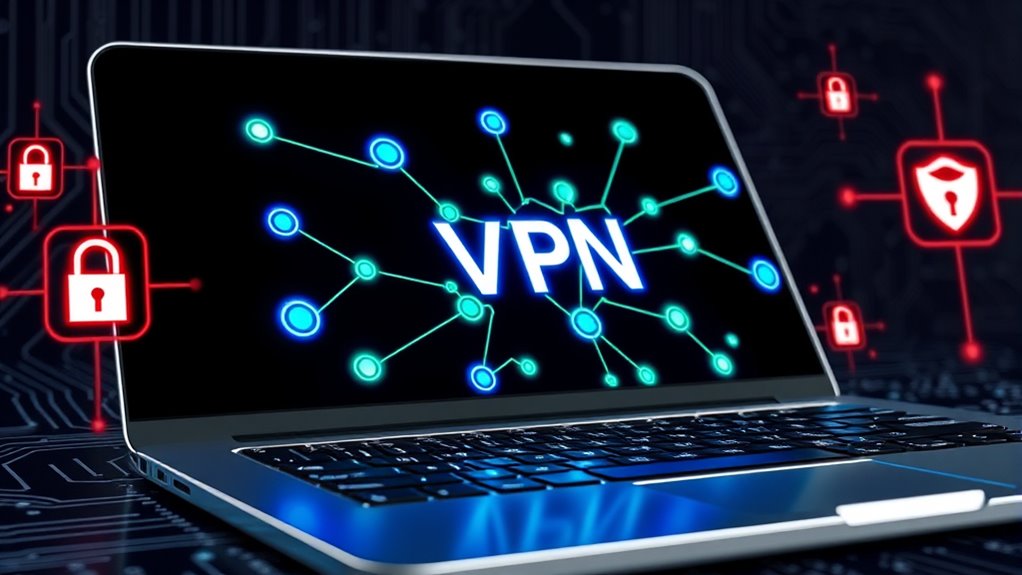
OpenVPN offers robust security with advanced encryption protocols that protect your data and guarantee privacy. It’s known for its broad compatibility across different devices and operating systems, making it easy to set up and use. By understanding its features, you can better assess how it fits your VPN needs. Additionally, OpenVPN’s security features incorporate continuous learning models that adapt to emerging cyber threats in real-time.
Security Protocols and Encryption
OpenVPN employs robust security protocols and strong encryption methods to guarantee your data remains private and protected. It uses a variety of cryptographic algorithms, such as AES (Advanced Encryption Standard), ensuring your information stays secure during transmission. OpenVPN adheres to strict encryption standards, allowing customization of security settings based on your needs. It supports multiple encryption algorithms, including Blowfish and Camellia, providing flexibility and layered security. The protocol also uses SSL/TLS for key exchange and authentication, adding an extra layer of protection against eavesdropping and man-in-the-middle attacks. By leveraging these cryptographic algorithms and encryption standards, OpenVPN creates a highly secure environment, making it a trusted choice for safeguarding your online privacy and sensitive data. Additionally, OpenVPN’s adoption of on-device AI capabilities is set to enhance security features through intelligent threat detection and adaptive encryption techniques.
Compatibility and Ease of Use
Thanks to its widespread support and flexible configuration options, OpenVPN is known for being highly compatible across various operating systems and devices. You can easily set it up on Windows, macOS, Linux, Android, and iOS, making it versatile for different users. Its user friendliness is evident through detailed guides and community support, helping you navigate installation and troubleshooting without hassle. OpenVPN’s compatibility ensures you don’t need multiple VPN solutions for different devices, simplifying your setup. Its open-source nature also allows for customization, giving you more control. Additionally, high refresh rates in related display technology highlight the importance of performance features, although they are less relevant to VPN setup. Overall, this combination of device compatibility and user-friendly features makes OpenVPN a reliable choice for users seeking ease of use and broad support.
Exploring WireGuard: A Modern VPN Protocol

WireGuard is a sleek and modern VPN protocol designed to provide fast, secure, and easy-to-configure connections. Its wireguard architecture simplifies setup by using a minimal codebase, making it easier to audit and maintain. This streamlined design results in lower latency and improved performance, ideal for VPN tunneling. Unlike traditional protocols, WireGuard relies on state-of-the-art cryptography to ensure robust security. You’ll find that configuring WireGuard is straightforward, thanks to its simple key management and concise configuration files. Its lightweight structure not only enhances speed but also reduces the attack surface, making it a popular choice for users seeking a modern, efficient VPN protocol. Overall, WireGuard’s architecture and VPN tunneling approach deliver a seamless, high-performance experience, supported by easy-to-maintain design principles that promote longevity and security.
Comparing Security Aspects of OpenVPN and WireGuard
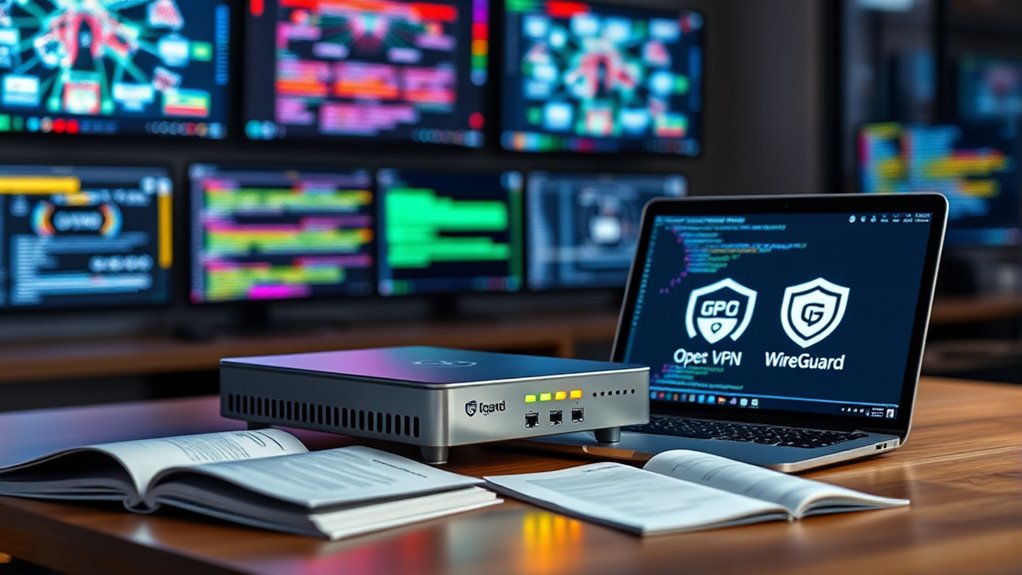
While both OpenVPN and WireGuard aim to secure your internet traffic, they employ different approaches to achieve robust security. OpenVPN uses VPN tunneling with multiple encryption standards, including AES-256, providing a flexible and time-tested security layer. It relies on OpenSSL for cryptographic functions, allowing customization of encryption and authentication methods. WireGuard, on the other hand, simplifies security with a smaller codebase and modern cryptography, such as ChaCha20 for encryption and Poly1305 for authentication. Its streamlined design reduces potential vulnerabilities and makes it easier to audit. Overall, both protocols deliver strong security, but OpenVPN’s extensive encryption options offer flexibility, while WireGuard’s modern cryptography emphasizes simplicity and efficiency. Your choice depends on your specific security needs and preferences. Implementing robust encryption practices is essential for maintaining data integrity and confidentiality in today’s digital environment.
Performance and Speed: How They Measure Up
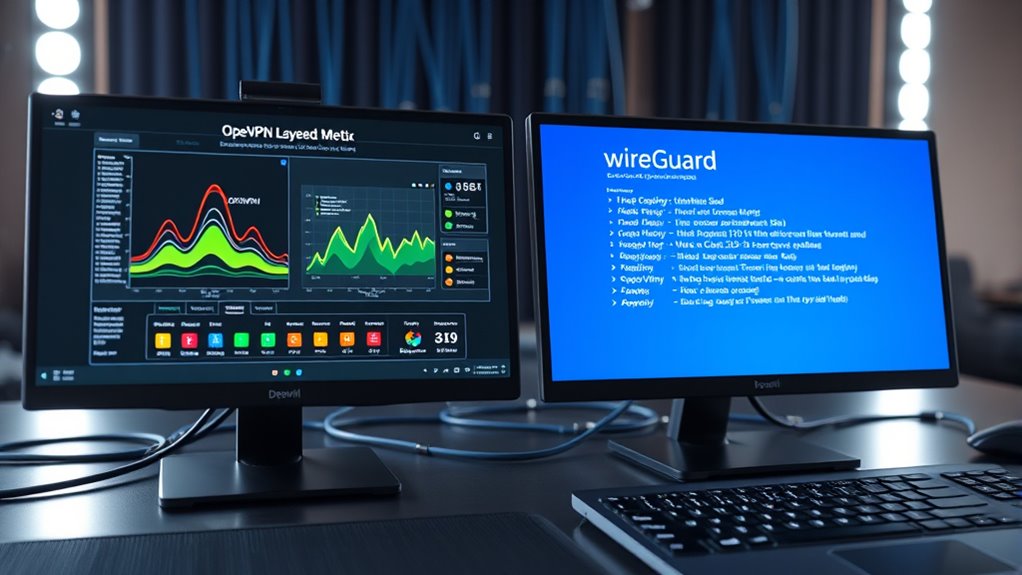
When it comes to VPN performance and speed, the protocols differ considerably in how efficiently they handle data transmission. OpenVPN can be affected by server load and bandwidth management, often experiencing slower speeds during peak times. WireGuard, on the other hand, is designed for minimal overhead, offering faster, more consistent performance. Your experience depends on how well the protocols manage network resources and optimize data flow. Factors like server load can cause fluctuations, especially for OpenVPN, while WireGuard’s streamlined code helps maintain steady speeds. To better understand their performance, consider these points:
- Server load impacts connection speed and stability
- Bandwidth management determines data transfer efficiency
- Protocol design influences how quickly data transmits across networks
- Kia Tuning techniques illustrate how performance enhancements depend on optimized system management and streamlined modifications.
Ease of Setup and Compatibility With Devices

Setting up a VPN protocol can vary considerably in complexity, depending on the device and software you use. OpenVPN offers broad device compatibility, but its setup process can be more involved, often requiring manual configuration or third-party apps. In contrast, WireGuard emphasizes simplicity, providing a straightforward setup that many users find easier and quicker. If you use popular operating systems like Windows, macOS, Android, or iOS, you’ll generally find compatible clients for both protocols. However, some devices or routers may have limited support for OpenVPN, making setup more challenging. Overall, WireGuard tends to deliver a smoother setup experience, especially for those new to VPNs, while OpenVPN’s extensive compatibility might demand a bit more technical effort. Additionally, market growth in VPN technology highlights the increasing importance of choosing a protocol that balances security with ease of use.
Power Consumption and Efficiency Considerations

VPN protocols differ markedly in how they impact power consumption and device efficiency. If you’re using a VPN on a mobile device, this can influence your battery drain and overall energy efficiency. Some protocols, like WireGuard, are designed to be lightweight, reducing power usage and extending battery life. Others, like OpenVPN, may require more processing power, leading to faster battery drain. Additionally, the type of headphone jack used can influence device compatibility and power requirements during VPN use.
- Protocol design affects how much CPU power is needed, directly impacting energy efficiency.
- Encryption strength can increase processing load, affecting battery life.
- Connection stability influences how often your device has to re-establish secure links, impacting power consumption.
Choosing a protocol optimized for efficiency helps conserve battery and improves device performance during extended use.
Implementations and Support in VPN Services

The implementation of VPN protocols varies widely across different services, affecting how easily you can access and configure secure connections. Some VPN providers integrate protocols like OpenVPN and WireGuard directly into their VPN server infrastructure, offering seamless support and user-friendly setups. Protocol tunneling is a key feature that these services leverage to securely encapsulate your data within encrypted channels, regardless of the protocol chosen. Compatibility with popular operating systems and devices is often a deciding factor in support, enabling you to connect effortlessly across platforms. Many providers also offer custom apps or manual configuration guides, making protocol implementation more accessible. Overall, the level of support and how protocols are implemented can considerably impact your VPN experience, from setup ease to connection stability. Additionally, water-based activities like hydrotherapy demonstrate how water can be used therapeutically, highlighting its importance in health and wellness.
Choosing the Right Protocol for Your Needs
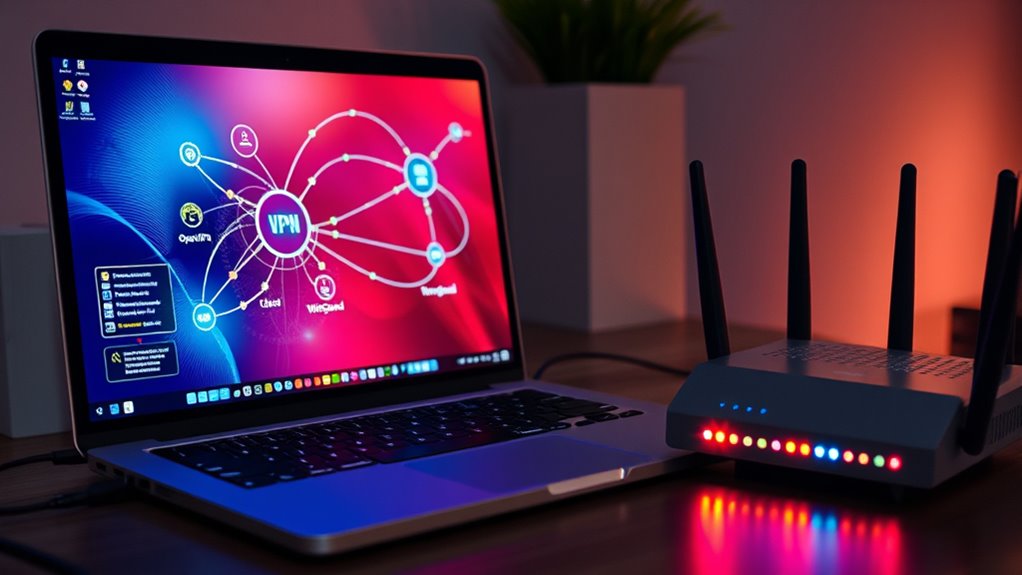
Choosing the right protocol depends on your specific needs and priorities, such as speed, security, and device compatibility. A good protocol guarantees efficient protocol tunneling and smooth connection to your VPN server. If speed is essential, WireGuard offers fast performance with modern encryption. For maximum security, OpenVPN provides robust encryption but may be slightly slower. Consider device support—some protocols work better on certain platforms. Also, think about how the protocol handles protocol tunneling to maintain stable, secure connections.
- Prioritize speed if you stream or game frequently
- Opt for security if you’re handling sensitive data
- Check device compatibility to avoid setup issues
Future Trends in VPN Protocol Development
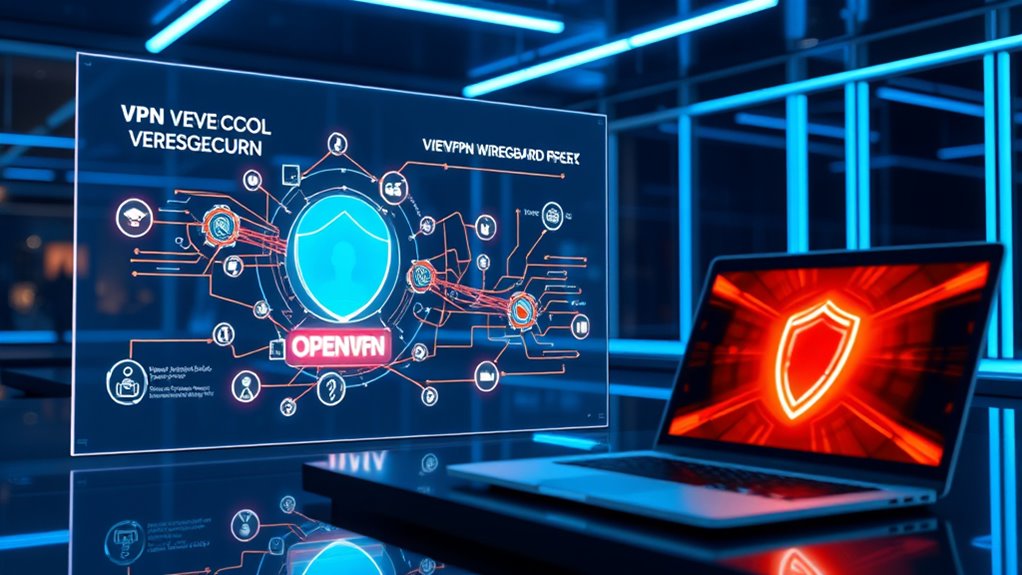
As technology advances, developers are focusing on creating protocols that are faster, more secure, and easier to deploy. Quantum encryption is becoming a key focus, aiming to protect data against future quantum computing threats by leveraging advanced cryptographic techniques. Additionally, decentralized networks are gaining traction, offering enhanced privacy and resilience by removing centralized points of failure. Future VPN protocols are likely to incorporate these innovations, making connections more secure and resistant to attacks. You can expect new protocols to prioritize lightweight performance for seamless deployment across various devices, while also integrating quantum-safe algorithms. These trends will help guarantee your VPN remains robust against evolving security challenges, providing a more reliable and private online experience as technology continues to evolve.
Frequently Asked Questions
How Do VPN Protocols Impact Online Streaming Quality?
VPN protocols directly impact your streaming quality by affecting connection latency and the streaming buffer. When you choose a protocol like WireGuard, it often offers lower latency, reducing buffering interruptions and providing smoother playback. Conversely, protocols with higher latency might cause longer buffering times, making your streaming experience less enjoyable. So, selecting the right VPN protocol helps guarantee your connection stays fast and stable, improving your overall streaming performance.
Are There Legal Restrictions on Using Certain VPN Protocols?
Sure, you can use any VPN protocol you fancy, but don’t forget the legal compliance part. Some countries impose protocol restrictions or outright ban certain VPNs, making your choice a game of legal roulette. While OpenVPN and WireGuard are generally safe bets, always check local laws. Ignoring restrictions might sound fun now, but the legal consequences could turn your online adventure into a costly lesson.
Can VPN Protocols Bypass Government Censorship Effectively?
You wonder if VPN protocols can bypass government censorship effectively. The answer depends on the protocol’s effectiveness in evading detection and blocking. Some protocols, like WireGuard, are faster and more efficient, making them harder for governments to identify and restrict. However, censorship measures evolve, so no protocol guarantees complete success. Using a reliable protocol combined with obfuscation techniques increases your chances of bypassing censorship successfully.
Do Different Protocols Affect VPN Connection Stability?
Think of your VPN connection as a well-tuned vehicle—different protocols are like engine types. Protocol compatibility and protocol encryption directly impact connection stability; some are more reliable and faster, like WireGuard, while others may face compatibility issues, like older OpenVPN versions. Your choice influences how smoothly your connection runs, especially under network fluctuations. So, selecting the right protocol guarantees a more stable, secure experience, much like choosing the best engine for a smooth ride.
How Do VPN Protocols Handle Device-Specific Security Features?
When it comes to device-specific security features, VPN protocols handle them differently through device encryption methods and protocol compatibility. You’ll find that some protocols, like OpenVPN, support a wide range of device encryption standards, ensuring your device’s security. Others, such as WireGuard, prioritize protocol compatibility with modern devices, making setup seamless. Your choice depends on balancing device encryption strength and ensuring the protocol works smoothly with your device’s security features.
Conclusion
Choosing between OpenVPN and WireGuard is like selecting the right key for your digital fortress; both open doors, but each offers different strengths. By understanding their features, security, and performance, you can pick the protocol that best suits your needs. Stay informed about evolving VPN technologies, so you’re always one step ahead in safeguarding your online world. Remember, the right protocol isn’t just a tool—it’s the foundation of your digital peace of mind.









